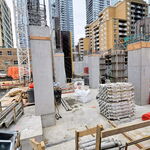@MisterF
You are assuming that the HSR will be routed via the airport. What if, for example, the powers that be decide to continue on Lakeshore to Hamilton? At the speeds that HSR would operate, there's a case to be made to go Union-Hamilton-Kitchener-London. I wouldn't rule out anything until we know a definitive routing.
WRT private sector involvement. Colour me skeptical. They've proposed being involved. With government bearing most of the risks, most of the burden of financing, and the smallest share of profit. Who wouldn't want that deal? They could've gone whole hog and proposed mag-levs.
Believe me. I want HSR. I'm off to Spain in 2.5 days. And me and the wife will be jetting around on their HSRs to different cities during our honeymoon. I would love for nothing more than to have HSR here, such that, I could contemplate jetting off to Quebec City or Ottawa for an evening. HSR would absolutely change the economic dynamics in this country. Smaller centres like Kingston and London would become much more attractive. Businesses would effectively have a 500km catchment area when travelling that far takes just 2-3 hours.
But what makes me skeptical is that there appears to be no large constituency for spending $20 billion on an HSR system. More so when quite a few cities with VIA service today might lose them. VIA Fast seems to offer the most political bang for the buck. And as we've seen with the gas plants scandal, politicians spend money for seats in these parts. Not for effective infrastructure. With that in mind, I'd rather support something (VIA Fast as some sort of interim solution) that gets us HSR in 50 years, than wait 50 years with nothing till they build HSR.




